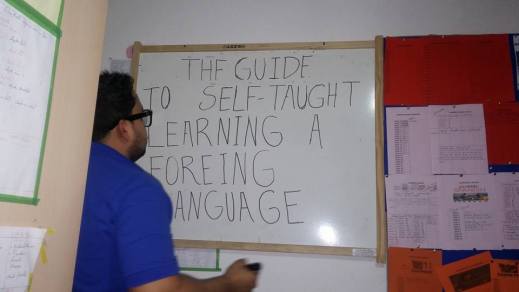Tips to learn any language from speakers of 9 languages
Matthew Youlden can speak nine languages fluently and understand more languages than that. Working together in Berlin, I often heard him use this skill, switching between them like a chameleon changing colors. Actually, I didn't know for a long time that he was an Englishman. When I told Matthew how hard I struggled to pick a second language, Matthew gave me the following advice. If you still think that you can never speak 2 languages, take these tips right away.
Tips for learning languages from Matthew
1. Know exactly what you are doing
This may seem obvious but it is true that if there is no good reason to learn a new language, it will be hard for you to keep your motivation and enjoyment for a long time. Wanting to impress those who speak English in French is not a good reason, wanting to know a French person through their language is completely different. No matter what your reason is, once you make a choice, pledge: " Yes, I want to learn this language and I will do what I can ".
2. Search for a companion
Matthew studied many foreign languages with his twin brother Michael (they learned Greek first when they were only 8 years old). Matthew and Michael, (or Super Polyglot Bros - a couple of multilingual brothers) have gained energy from their own brothers.

"We were very motivated to study and it is still the same. The two brothers push each other to be able to try. If he realizes I am learning more, he will be a bit jealous and try to overtake me (probably because we are twins) - and the opposite way too. "
As soon as you do not have siblings to join in the adventure in this world of language, look for any companion who can motivate you both to always try and stick with learning.
"I think it's a great way. You have someone to talk to, that's the idea behind learning a language."
3. Tell yourself
When there is no one to say, there is nothing wrong with saying it alone.
"It may sound strange but actually speaking alone is a good practice if you can't use new languages much."
This helps the mind to recall words and phrases, build confidence for the next time you really talk to someone.
4. Don't go astray
If communication is your original goal, there will be few cases when you "get lost" in your textbooks. Talking to people will help your learning process go in the right direction.
"You are learning a new language to be able to use it, not to say it to yourself. A creative way is to put the language you are learning into everyday life - for example, writing songs, talking and talking. It doesn't need to travel, you can go to the Greek restaurant in the street and order Greek food.

5. Create fun while learning
Use the new language in creative ways. Super Polygot Bros siblings often practice Greek by writing and recording songs. Think of cool ways to practice a new language like making a radio show with you, drawing stories, writing poems or simply talking to anyone you can. If you can't create a way to make language learning a joy, chances are you're not following advice # 4.

6. Act like a child
This does not mean that you should get angry like children or put food on your hair when you go to dinner at a restaurant, but learn how children learn. The idea that children can learn better than adults in an innate way is being given a myth. New research cannot find a direct link between age and learning ability . The key to learning as fast as children can simply be that they have children-like attitudes: for example, lack of self-awareness, desire to play with language or to make mistakes.
We learn through mistakes. Just like children, we are hoping to make mistakes, but for adults it becomes a taboo. Think, adults often say " I can't " instead of saying " I haven't learned yet " (I can't swim, I can't dive, I can't speak Spanish). Failure or simply looking at struggling with what is something to avoid in adult society but does not burden children. When learning a new language, accept that you don't know everything (and feel fine with it) is the key to developing and feeling free. Get out of your mature cocoon .
7. Leave your safe zone
Being ready to make mistakes means you are always ready to put yourself in situations that are likely to cause awkwardness. This can be a bit scary but the only way to grow. No matter how much you have learned, you will never speak that language if you don't push yourself out, talk to strangers in that language, ask for directions, order jokes . The more you practice regularly, the wider your safety zone, the more comfortable you will be in new situations.
"At first, you will have to go through difficulties: be it pronunciation, grammar, syntax, or you don't understand what they say. But I think the important thing is to always develop, expand feelings. Every native speaker has a feeling of their language and basically that's what makes them a native speaker - whether you can make it your language or not.

8. Listen
You need to listen before speaking. Every language sounds strange when you hear them for the first time, but the more you "engage" and expand yourself, you will find it to become more familiar and easier to say.
"We can say anything, it's just that we don't do it often. For example, the" r "scroll is not in English but when I learn Spanish, the" r "sound is very heavy in words like "perro" or "reunión." For me, the best way to master it is to hear that word often, visualize it, imagine what it would be like to pronounce it by creating every sound. bar, we all use a specific part in the mouth or throat to get that sound ".
9. See people talking
Different languages require different requirements on how to use the tongue, lips and throat. The pronunciation is also based on physical factors.
"It may sound strange but a great way is to look at someone while they are talking and try to imitate that sound as much as possible. Believe me, this may be difficult at first but you will be able to do it. Just practice, this is actually very easy. "
If you can't meet in person to watch and imitate native speakers, watch foreign language movies or TV shows.
10. Really immerse yourself in learning
Now you are committed to learning but how to maintain it? Is there a right way to learn? Matthew suggests a 360-degree approach: No matter which learning tool you use, practicing new language daily is paramount.

"I often want to" absorb "as much as possible from the beginning, so if I learn a new language, I will really, really try and use it every day. Week after week, I try try to think in that language, write it down and even try to tell yourself in that language, the problem here is to put what you have learned into practice - maybe write an email, say It's important to talk to yourself, listen to music or listen to the radio.
Remember that the best results when learning to speak a language are for people to talk to you. Having a simple conversation is also a great reward. Achieving such milestones will help you stay motivated and continue to practice. And don't worry that it will make others upset when your speaking ability is poor, say "I'm studying and I want to practice .". Most people will be patient, encouraging and happy to help you.
Author: John-Erik Jordan
You should read it
- ★ 7 compelling reasons for you to definitely learn a foreign language
- ★ 7 simple tips to help you learn new languages in just one week
- ★ 16 effective English word puzzle games on Android and iOS
- ★ The secret to effective language learning from a 35-year-old man who speaks 11 languages
- ★ 5 ways to learn 'unusual' foreign languages on a PC or smartphone